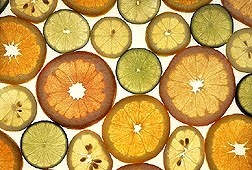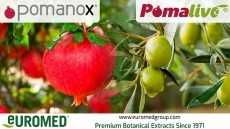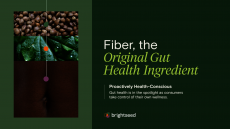Pectin shows potential against prostate cancer
induce programmed cell death in prostate cancer cells, suggests a
new laboratory study from the US.
Writing in the journal Glycobiology, researchers from the University of Georgia report that prostate cancer cells exposed to pectin reduced the number of cells by up to 40 per cent, and is said to be the first to report benefits against prostate cancer. "What this paper shows is that if you take human prostate cancer cells and add pectin, you can induce programmed cell death," said lead researcher Debra Mohnen. "If you do the same with non-cancerous cells, cell death doesn't occur." Over half a million news cases of prostate cancer are diagnosed every year world wide, and the cancer is the direct cause of over 200,000 deaths. More worryingly, the incidence of the disease is increasing with a rise of 1.7 per cent over 15 years. The new study looked at the effect of different forms of pectin - commercially available fractionated pectin powder (FPP), citrus pectin (CP), and pH-modified CP (PectaSol) - on hormone- (androgen) responsive and androgen-independent human prostate cancer cells. Lead author Crystal Jackson report that the FPP induced apoptosis (programmed cell death) by about 40 fold, compared to non-treated cells, for both types of cancer cells. Chemical treatment of the FPP using base (alkali) in order to remove the ester linkages of the pectin structure destroyed the ability of the pectin to induce apoptosis, said the researchers, while treatment of the pectin with pectinmethylesterase enzymes did not affect activity, indicating that the base-sensitive linkages played an important role in the apparent anti-cancer benefits. Both citrus pectin and the pH-modified citrus pectin had no effect on the cancer cells, reported Jackson, but heat treatment of citrus pectin resulted in significant levels of apoptosis comparable to FPP. "These results indicate that specific structural elements within pectin are responsible for the apoptotic activity, and that this structure can be generated, or enriched for, by heat treatment of CP," wrote Jackson. "These findings provide the foundation for mechanistic studies of pectin apoptotic activity and a basis for the development of pectin-based pharmaceuticals, nutraceuticals, or recommended diet changes aimed at combating prostate cancer occurrence and progression," concluded the authors. Mohnen called for more study into the potential anti-cancer benefits of pectin, but said that increased fruit and vegetable intake would provide consumers with significant benefits. "Even though we hear constantly that we're supposed to eat lots of fruits and vegetables, it wasn't until we started working on these studies that it finally hit home how really important that was," she said. "By simply increasing your intake of fruits of vegetables, you're going to get a lot of pectin and you're going to get all of the other beneficial phytochemicals at the same time." The study adds to the growing body of evidence on the health benefits of pectin, which has been shown to have a prebiotic effect, lower cholesterol and glucose levels in humans, and may also have potential for weight management. The ingredient, with worldwide production estimated at 35,000 tonnes a year, is currently widely used as gelling agents in jams, confectionary, and bakery fillings, and stabilisers in yoghurts and milk drinks. The majority of pectin used currently comes from citrus peel and apple pomace. Other sources of the ingredient, like sugar beet and pumpkin, have remained largely unexploited because of certain undesirable structural properties. Source: Glycobiology August 2007, Volume 17, Issue 8, Pages 805-819; doi:10.1093/glycob/cwm054 "Pectin induces apoptosis in human prostate cancer cells: correlation of apoptotic function with pectin structure" Author: C.L. Jackson, T.M. Dreaden, L.K. Theobald, N.M. Tran, T.L. Beal, M. Eid, M. Yun Gao, R.B. Shirley, M.T. Stoffel, M.V. Kumar and D. Mohnen













